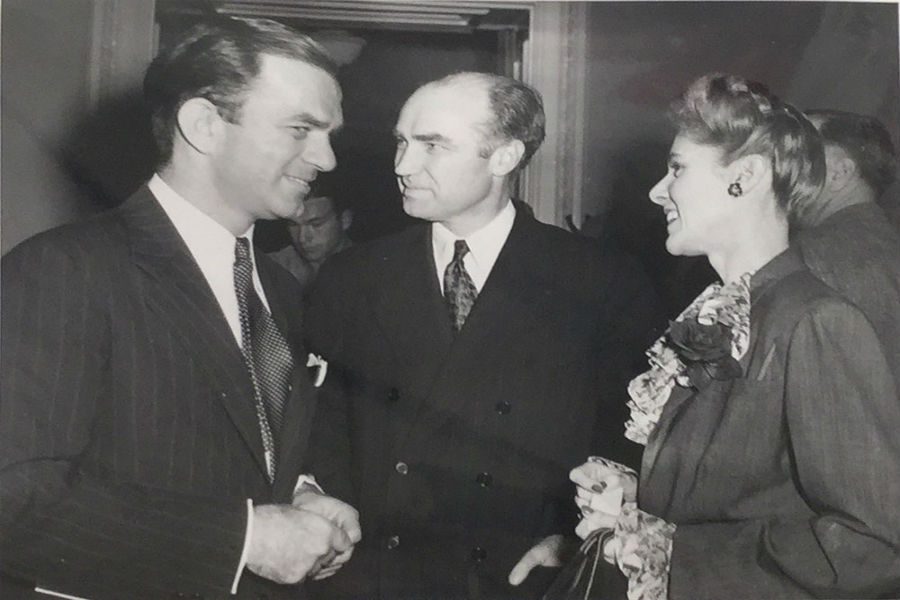Woman of the Month: The journalist, politician, playwright
Clare Boothe Luce and Senator Fulbright, conversing at a party.
December 2, 2019
Clare Boothe Luce was a multi-talented woman, whose influence spread through journalism, politics, and playwriting. The language skills she displayed throughout her life enabled her to make her mark on feminism.
On March 10, 1903, Clare Boothe Luce was born to Ann Clare Snyder Boothe, a former chorus girl, and William F. Boothe, an executive for the Boothe Piano Company.
In 1919, a return voyage from Europe resulted in her meeting with wealthy Manhattan suffragist, Alva Erskine. Erskine led Luce to her first husband, millionaire George Brokaw.
But after six years, the wedding bliss had faded, culminating in Luce suing for divorce due to mental cruelty. Undeterred by the rough start as a divorcee at twenty-six, the alimony she received allowed Clare to begin the life of success she was destined to lead.
Supported by her wealth, Clare joined the world of literature, becoming managing editor of Vanity Fair by 1933. But after only a year, she left her post as an editor, to devote her attention to playwriting.
On December 26, 1936, her first major success The Women debuted. The satirical play about men and the flamboyance of wealthy women consisted of a cast of thirty-eight women.
When Clare married co-founder of Time magazine Henry R. Luce, her success as an independent woman increased ten-fold. The couple’s partnership in both business and life resulted in the development of Life, one of the world’s most popular magazines.
Through her attempts to influence American culture, Clare found herself involved in politics as well. During World War II, Clare felt inclined to be knowledgeable regarding political changes. This inclination led to her support of Republican candidate Wendell Wilkie, in the 1940 election. Despite Wilkie’s loss of the election, the forty speeches and appearances Clare made on his behalf supplied her with valuable political activism experience.
Through her passion, Clare gained the respect of numerous powerful politicians. In the early 1940s, she traveled the world, working as a Life correspondent. Her documentation of the World War II effort in Europe, Europe in Spring, drew the interests of Republican party leaders, men, who in 1942, convinced her to run for Connecticut’s Second District seat in Congress.
Clare’s campaign theme based on her criticism of Roosevelt’s “handling of the war” (Clare Boothe Luce), enabled her to supplant the Democratic incumbent and won her a seat on the Committee on Military Affairs.
Clare was determined to improve both domestic and foreign policies, proposing gender equality in the military, and an end to immigration restrictions. She further improved foreign affairs with her aid in the 1943 development of “international machinery”, Senator Fulbright’s plan to establish and maintain peace. Following World War II, Fulbright’s plan assisted with the establishment of international programs such as NATO and the UN.
While touring Europe with a congressional delegation, Clare found her opposition to America’s foreign policies during wartime bolstered by the devastation.
Upon her return, she continued to promote the need for improved foreign policies, but often, her insights were overlooked by many of her fellow politicians. Inspired by the devastation in Europe, she revealed a plan for its recovery to Congressman Everett Dirksen. Two years following her revelation of the plan, a nearly identical plan was proposed by Secretary of State George Marshall, effectively erasing Clare’s name from her brainchild.
Undeterred by the effacement of her influence on the Marshall Plan, Clare’s vociferous tendencies resulted in her selection as the keynote speaker for the Republican National Convention, the first woman to be afforded such an honor.
Despite her success in Congress, when the time came, Clare decided to not seek reelection. But, she was not finished with her mark on politics. Clare’s campaigning for Eisenhower culminated in an offer as secretary of labor in his cabinet. But, her refusal in favor of a position as ambassador in Italy, earned her the privilege of the “first woman to represent the United States in a major foreign embassy” (Clare Boothe Luce).
Until the end, Clare pushed for improvement to foreign policies. In the 1970s, under the administrations of Nixon, Reagan, and Ford, she served on the President’s Foreign Intelligence Advisory Board.
When Clare died in 1987, she held numerous honors and awards for her influences on culture and politics.
Clare’s wide influence on both the political world and mainstream media demonstrates how women can impact the world based on their own merits. Every moment of Clare’s adult life was dedicated to something profound. From the moment she stepped foot into her life as an independent young woman, she endeavored to push the envelope.
Clare did not limit herself to one avenue of impact, she strove to influence both American culture and politics. Her play The Women allowed her to convey her opinion of gender inequality and the wealthy elite. Furthermore, her employment of a cast comprised of only women revealed her desire to provide women with jobs other than those of secretaries or assistants.
With politics being mainly male-dominated, Clare’s success in the field demonstrates to young women throughout the world that they can take control of their government and produce change. As the “first woman to represent the United States in a major foreign embassy,” she set a precedent for other women to more easily be selected for such a post.








